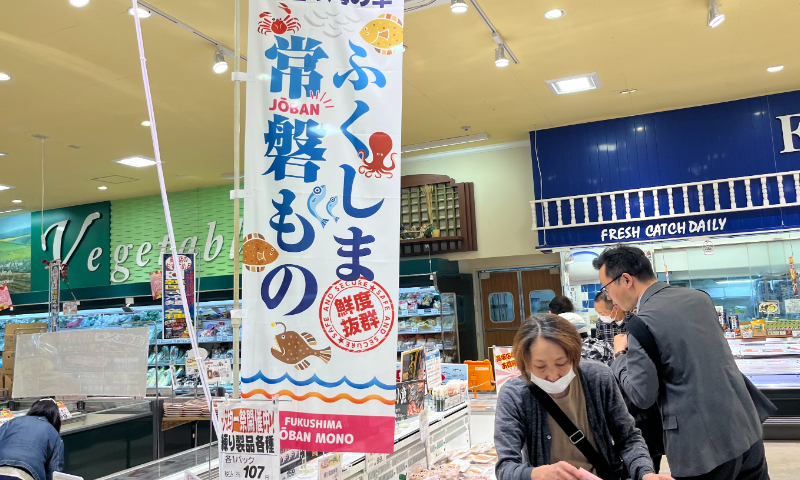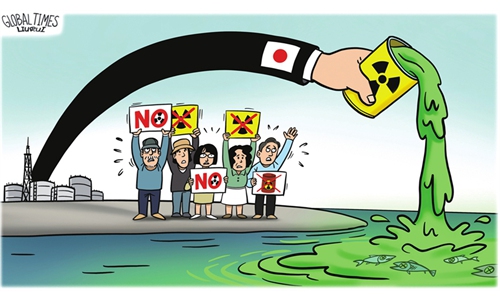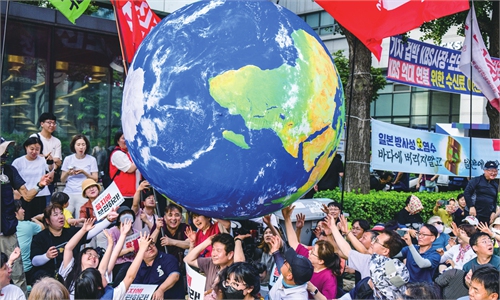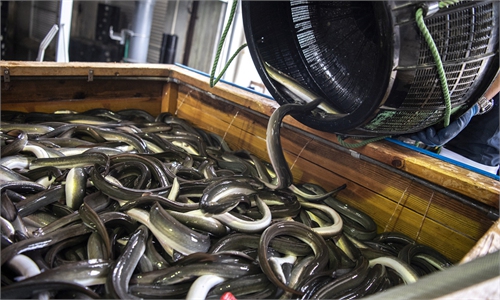Chinese importers, consumers are spooked by Japan's nuclear waste water dumping to Pacific
Japanese seafood, other products to undergo strict scrutiny

Photo: Xu Keyue/GT
Concerns over safety of imported seafood from Japan are on the rise among Chinese importers and consumers, after the Japanese government has moved closer to carrying out a plan to discharge treated radioactive water into the sea from its crippled nuclear plant.Chinese importers are taking a wait-and-see approach about future imports from Japan, while some are replacing Japanese-brand cosmetics and baby products with other international brands, as seen in social media trending in China, the Global Times has learned.
"Many Chinese importers have expressed concerns, and consulted with me about how Japan's plan to discharge the radioactive water into the sea will affect the domestic market and their business," Cui He, director of the China Aquatic Products Processing and Marketing Alliance, told the Global Times on Sunday.
"They are uncertain about how to maintain import quantity given Chinese consumers' rising worries. And, some companies have responded by sharply cutting their imports from Japan to fend off potential risks," Cui said.
A representative of a seafood-focused logistics firm based in North China's Tianjin told the Global Times on Sunday that it has been "closely monitoring the situation", and now the company is taking a wait-and-see approach "just like most of our peers."
The representative said the possibility of largely slashing Japanese imports could not be ruled out if Chinese consumers choose to shun the food from Japan as they are concerned about nuclear contamination.
An employee with local retailer Wumart told the Global Times on Sunday that "we have a warning system and will evaluate the situation. The government will communicate with us so that we have time to find substitutes for Japanese imports."
The reduction of Japanese maritime products will not have meaningful impact on the Chinese market as they make up only 2-3 percent of the total imports, and it is not difficult to find substitutes from other countries like Russia, the US, and Southeast Asian countries, according to Cui.
Chinese mainland was the biggest buyer of Japanese seafood in 2022 by value, accounting for 22.5 percent of Japanese seafood exports, worth 87 billion yen ($604 million), followed by China's Hong Kong SAR with 19.5 percent and the US with 13.9 percent, according to Japanese customs data.
The growing concerns among Chinese consumers came after the Japanese government edged closer to dump nuclear-contaminated water into the Pacific from the Fukushima Daiichi power plant, as the International Atomic Energy Agency (IAEA) concluded in a report that Japan's plan on July 4 was "consistent with international safety standards."
The IAEA assessment, however, faces wide opposition in the region.
China's Foreign Ministry on July 4 urged Japan to halt its dumping plan, adding that if Japan insists on going ahead with the dumping, it will have to bear all the consequences arising from it.
On Friday, China's General Administration of Customs said it will maintain the food import ban from Japan's Fukushima and nine other regions in order to protect the safety of Chinese consumers.
For food products from other regions in Japan, especially aquatic products, including edible aquatic animals, there will be "100 percent" strict inspection and screening of the certification documents, the Chinese customs authority said.
China also disapproves the IAEA report, noting "there are still many issues related to the legitimacy of Japan's dumping plan, like the reliability of the purification equipment, and the completeness of the monitoring plan."
China banned imports of food and agricultural products from Japan in the immediate aftermath of the 2011 nuclear plant disaster. The ban later was applied to 10 Japanese prefectures.
Since the start of the year, some Chinese firms have been fined for selling imported products from Japan's nuclear-contaminated areas.
On Chinese social shopping platform Xiaohongshu, some users said they have bought radiation detectors to find out whether Japanese cosmetics they are using is safe, and other said they will stop using Japanese brands.
Japan's other neighbors have also moved to heighten scrutiny of imported goods from Japan. Russia's consumer protection agency said it will ramp up supervision of imported Japanese fish and other marine products, according to the Interfax news agency.
Tokyo is poised to begin pumping out more than a million tons of treated water from the wrecked Fukushima nuclear power plant in August, and the process could take decades to complete.
More than 80 percent of respondents in 11 countries in the Asia-Pacific region, except for Japan, said Japan's plan of waste water dumping into the sea is "irresponsible" and nearly 90 percent of respondents expressed negative sentiments toward the plan, and 94 percent of them said the move will have a negative effect not only on Japan and Pacific Rim countries but also the whole world, a survey conducted by the Global Times Research Center has found.




